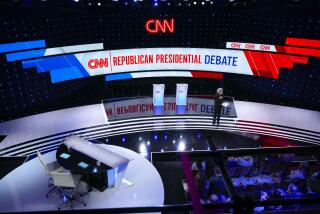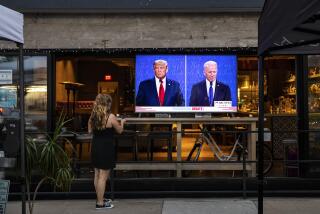‘Reforms’ That Aren’t : Politics: Some proposals would just make campaigns more boring, when Americans are busier than ever.
This campaign autumn is justifiably called a “silly season” for two reasons. One is the traditional surfeit of posturing, distortion and outright lies by candidates for office. The second reason, more evident than usual, is the abundance of campaign reform ideas that are just plain dumb.
One would think, from the fevered cries of Common Cause and various members of Congress, that our electoral system had hit new depths of corruption that no sensible citizen could tolerate. Such gross exaggerations win headlines for lobbyists and lawmakers but ignore the real reasons why steadily fewer people bother to vote.
The simple fact is that citizens are busier and more distracted from politics than at any previous time in the history of the republic. As two-paycheck marriages become the norm, mom and dad have less time for the children and perhaps none at all for politics. The same applies, double, to ever-increasing single-parent households.
Of course, Americans in the past worked hard, but for our forebears politics was often a raucous spectator sport. No more. Why bother with the droning of candidates when cable television, professional sports and Nintendo are at hand? The simple fact is that Americans have at their disposal more immediate entertainment. Is it any wonder that politics seems less important, particularly to the young, who wallow in electronic distraction?
Given this situation, proposals to restrict political commercials to a “talking head” format or to ban the notorious 30-second spots would only reinforce mass indifference. The solution to electronic politics is not to make it more boring, though certainly that is what many prim reformers have in mind when they ask for more “serious discussion of the issues.”
Many reformers also claim that too much money is spent in election campaigns. The recently passed Senate campaign reform bill operates on that premise by establishing spending limits. But why, when electoral politics is already crowded out by distractions, try to limit its ability to reach people through the media? Unless candidates are granted big blocks of time to use as they wish, less spending on TV will mean that even fewer voters will learn anything about who is running and why.
Certainly some reforms are needed. Access to money for competing candidates needs to be made more equal, and political consultants need to chastise miscreants in their trade more severely. But keep the race lively and very much on television, or voters will keep deserting the polls.
The elite interest groups and politicians dominating the debate on campaign reform have forgotten the circumstances of the average voter. Unless campaigns touch more people where they live--by the television--in a engaging way, our polling booths will gather dust.
More to Read
Get the L.A. Times Politics newsletter
Deeply reported insights into legislation, politics and policy from Sacramento, Washington and beyond. In your inbox three times per week.
You may occasionally receive promotional content from the Los Angeles Times.









